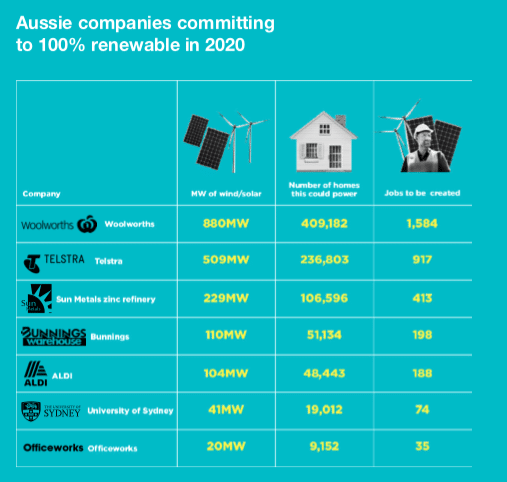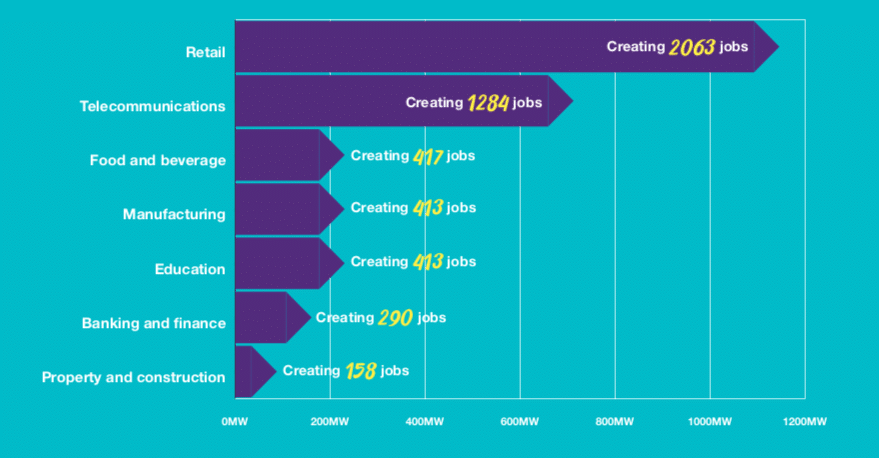The report, released today, shows the cumulative commitments of Australia corporations which surged in 2020, accounting for 1.8 GW of the 2.8 GW total. The retail industry emerged as the clear leader in the corporate race to renewables in 2020 with almost double the clean energy commitments of the next best performing industry, telecommunications.
In total, 28 of Australia’s biggest electricity-using companies have now made renewable energy commitments that, together, are the equivalent to powering 1.3 million households – almost all the homes in Brisbane and Perth combined – and will create 5041 clean energy jobs.
Just looking at 2020, the best year for Greenpeace’s ongoing REenergise campaign, pledges from retailers Aldi, Woolworths, Bunnings and Officeworks alone will drive 1893 MW of demand for renewable energy projects, largely over the next 5 years, creating 3,407 jobs.

Greenpeace
2020’s spike was largely thanks to Woolworths’ and Telstra’s commitments, with the companies each using 1% of total electricity Australia consumes. Woolworths is Australia’s 6th largest electricity user and will switch to 100% renewable electricity by 2025, which will require around 880 MW of solar and wind projects. As of November 2020, the supermarket chain has installation solar systems at more than 150 of its locations nationally. Another huge electricity user, Telstra’s switch, which will also happen by 2025, will see demand for 509 MW worth of renewable projects.
ALDI has set the most ambitious timeline for its transition – announcing it will be powered by 100% renewables by 2021 – and has signed two major deals with wind farms in NSW and Victoria.
Coles is now the only major Australian supermarket chain that has not committed to a 100% renewable energy target. The supermarket giant has, however, recently signed two major power purchase agreements in NSW and Queensland. The QLD deal with state government-owned generator and retailer CleanCo will see it source 90% of its electricity for its Queensland operations from locally generated wind solar.
Heavy industry commitments also made a big leap with major zinc refinery Sun Metals signing up to the RE100 initiative in November 2020, generating demand for 229 MW worth of renewable energy. Mining operations have also seen a push towards lowering emissions through the installation of solar and batteries recently, especially in Western Australia’s Goldfields.
“Who’s missing?” concludes the report. Well, surprise surprise, the Federal Government. The Guardian recently reported the Coalition has been stacking the emissions reduction panel with fossil fuel industry leaders. Alone in its resistance to Australia’s green energy transition, state governments and corporations are choosing to leave the country’s highest form of governance in its wake.
Australians are also onboard with the transition. 71% of Australians think Australian companies should set a goal to get to 100% renewables as part of their responsibility for tackling climate change, according to a UComms Poll commissioned by Greenpeace in September 2020. Likewise, 68.3% of people said they would rather work for a company that was buying renewable energy, over two thirds of respondents said they were more likely to buy a product from a company that used 100% renewable energy.
This content is protected by copyright and may not be reused. If you want to cooperate with us and would like to reuse some of our content, please contact: editors@pv-magazine.com.









By submitting this form you agree to pv magazine using your data for the purposes of publishing your comment.
Your personal data will only be disclosed or otherwise transmitted to third parties for the purposes of spam filtering or if this is necessary for technical maintenance of the website. Any other transfer to third parties will not take place unless this is justified on the basis of applicable data protection regulations or if pv magazine is legally obliged to do so.
You may revoke this consent at any time with effect for the future, in which case your personal data will be deleted immediately. Otherwise, your data will be deleted if pv magazine has processed your request or the purpose of data storage is fulfilled.
Further information on data privacy can be found in our Data Protection Policy.